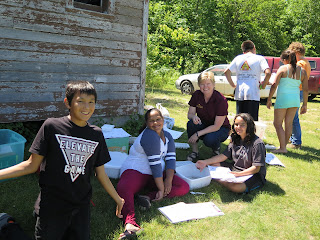By Karyn Santl
 I heard a local high school coach on the radio being asked about how to promote good team dynamics. Her answer was, “It’s about the relationships.” I couldn't agree more!
I heard a local high school coach on the radio being asked about how to promote good team dynamics. Her answer was, “It’s about the relationships.” I couldn't agree more!
As an educator in the area of positive youth development, I truly believe it all boils down to the relationships. Everyone wants to feel that they matter to others and that they belong to something or somewhere. Young people are no exception.
Belonging is one of the four essential elements of the 4-H youth development program. We define it as the need of young people to know they are cared about, and to feel a sense of connection to others in a group. As staff members and volunteers, it's our job to create a safe and inclusive environment that will foster positive relationships for the young people we serve.
My favorite youth development research comes from the Search Institute. They have some good recent research around actions that make young people's relationships powerful. They developed a framework for doing so.
Developmental relationships between youth and adults are an important aspect of any youth development program. Here in Minnesota, an annual student survey reveals that 40% of youth do not feel connected to an adult outside of their families – including teachers, coaches youth workers, mentors or others. So there are 4 out of 10 youth that don’t feel connected to an adult outside of their family. That is a problem for us to address.
What can youth workers do? I suggest that we start by developing relationships and a sense of belonging among the youth we work with. Over the years, I've come up with ways to do that.
You may have more. What strategies do you have to develop stronger connections with youth in your program?
You are welcome to comment on this blog post. We encourage civil discourse, including spirited disagreement. We will delete comments that contain profanity, pornography or hate speech--any remarks that attack or demean people because of their sex, race, ethnic group, etc.--as well as spam.
 I heard a local high school coach on the radio being asked about how to promote good team dynamics. Her answer was, “It’s about the relationships.” I couldn't agree more!
I heard a local high school coach on the radio being asked about how to promote good team dynamics. Her answer was, “It’s about the relationships.” I couldn't agree more!As an educator in the area of positive youth development, I truly believe it all boils down to the relationships. Everyone wants to feel that they matter to others and that they belong to something or somewhere. Young people are no exception.
Belonging is one of the four essential elements of the 4-H youth development program. We define it as the need of young people to know they are cared about, and to feel a sense of connection to others in a group. As staff members and volunteers, it's our job to create a safe and inclusive environment that will foster positive relationships for the young people we serve.
My favorite youth development research comes from the Search Institute. They have some good recent research around actions that make young people's relationships powerful. They developed a framework for doing so.
- Express care – Show young people that they matter to you by listening, encouraging and being trustworthy.
- Challenge growth – Push youth to keep getting better by expecting the best, holding them accountable, and helping them to reflect on and learn from their failures.
- Support – Help youth complete tasks and achieve goals by helping them to navigate through hard situations, build their confidence and advocate for them when needed.
- Share power – Treat youth with respect, give them a say when decisions involve them, create opportunities for them to take action and lead.
- Expand possibilities – Connect youth with people and places to broaden their world, exposing them to new ideas, experiences and places.
Developmental relationships between youth and adults are an important aspect of any youth development program. Here in Minnesota, an annual student survey reveals that 40% of youth do not feel connected to an adult outside of their families – including teachers, coaches youth workers, mentors or others. So there are 4 out of 10 youth that don’t feel connected to an adult outside of their family. That is a problem for us to address.
What can youth workers do? I suggest that we start by developing relationships and a sense of belonging among the youth we work with. Over the years, I've come up with ways to do that.
Tips for getting started
- Know each young person's name and call them by it
- Get to know their interests and ask about them
- Ask open-ended questions
- When they do something good (or not so good), tell them you noticed
You may have more. What strategies do you have to develop stronger connections with youth in your program?
-- Karyn Santl, Extension educator
You are welcome to comment on this blog post. We encourage civil discourse, including spirited disagreement. We will delete comments that contain profanity, pornography or hate speech--any remarks that attack or demean people because of their sex, race, ethnic group, etc.--as well as spam.
Comments
Post a Comment